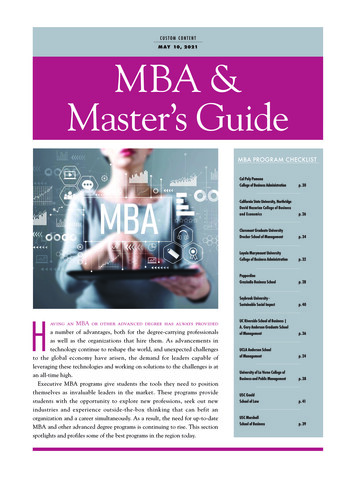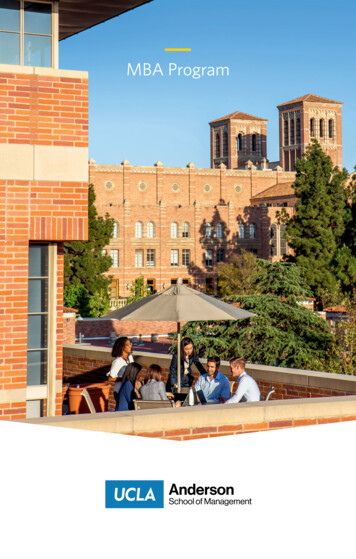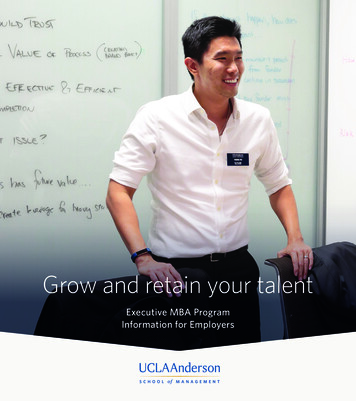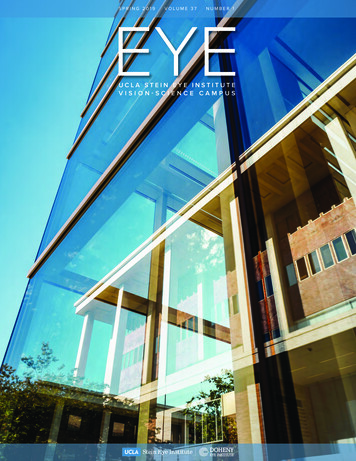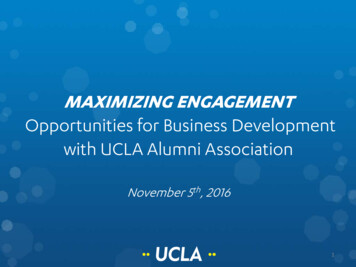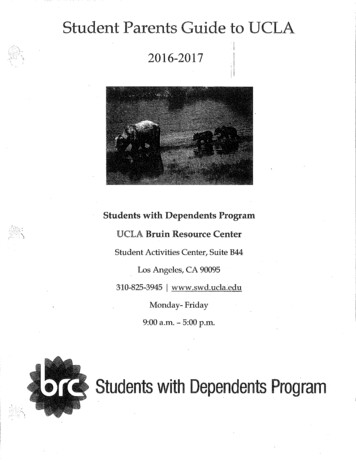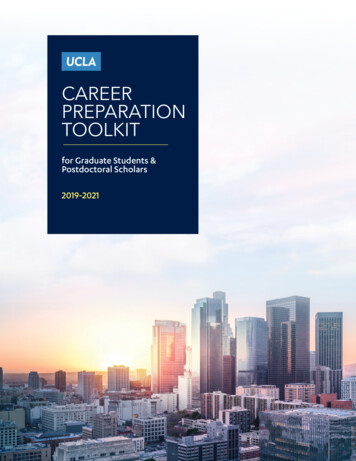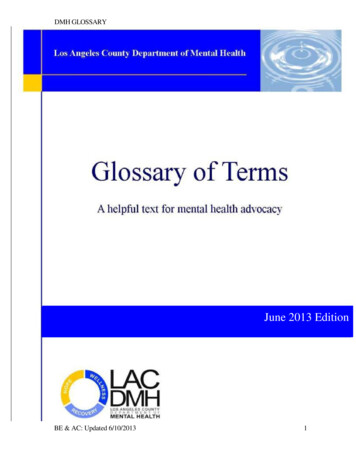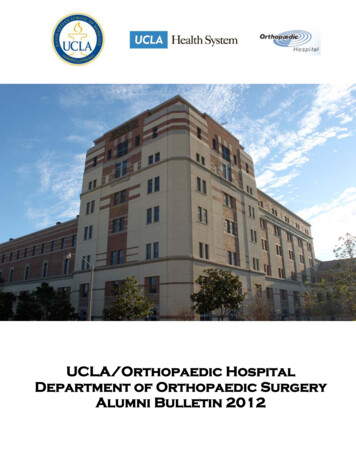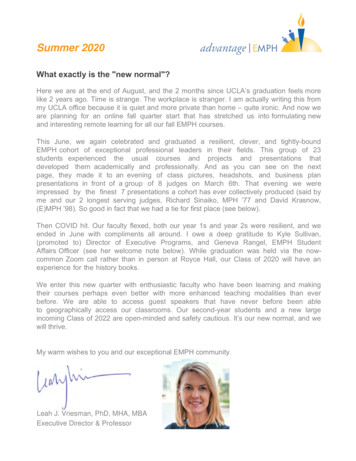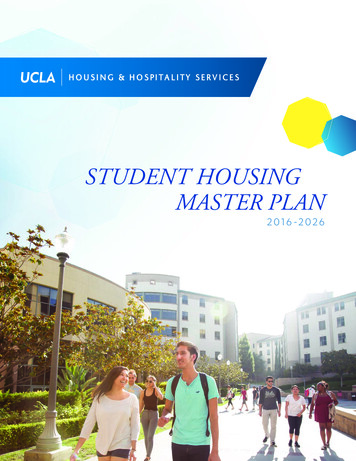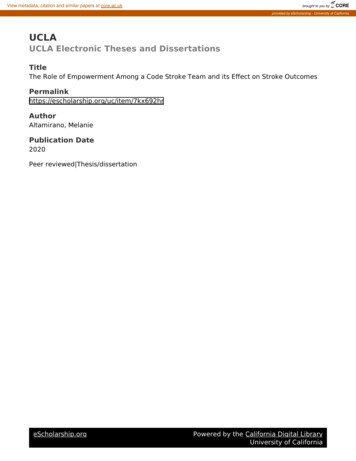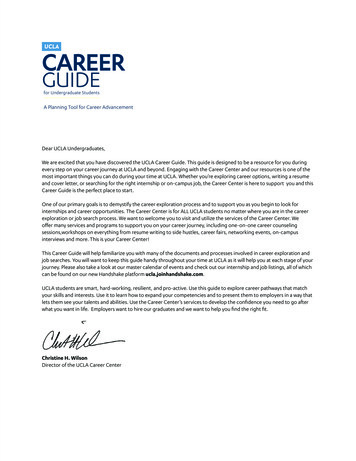
Transcription
CAREERGUIDEfor Undergraduate StudentsA Planning Tool for Career AdvancementDear UCLA Undergraduates,We are excited that you have discovered the UCLA Career Guide. This guide is designed to be a resource for you duringevery step on your career journey at UCLA and beyond. Engaging with the Career Center and our resources is one of themost important things you can do during your time at UCLA. Whether you’re exploring career options, writing a resumeand cover letter, or searching for the right internship or on-campus job, the Career Center is here to support you and thisCareer Guide is the perfect place to start.One of our primary goals is to demystify the career exploration process and to support you as you begin to look forinternships and career opportunities. The Career Center is for ALL UCLA students no matter where you are in the careerexploration or job search process. We want to welcome you to visit and utilize the services of the Career Center. Weoffer many services and programs to support you on your career journey, including one-on-one career counselingsessions,workshops on everything from resume writing to side hustles, career fairs, networking events, on-campusinterviews and more. This is your Career Center!This Career Guide will help familiarize you with many of the documents and processes involved in career exploration andjob searches. You will want to keep this guide handy throughout your time at UCLA as it will help you at each stage of yourjourney. Please also take a look at our master calendar of events and check out our internship and job listings, all of whichcan be found on our new Handshake platform ucla.joinhandshake.com.UCLA students are smart, hard-working, resilient, and pro-active. Use this guide to explore career pathways that matchyour skills and interests. Use it to learn how to expand your competencies and to present them to employers in a way thatlets them see your talents and abilities. Use the Career Center’s services to develop the confidence you need to go afterwhat you want in life. Employers want to hire our graduates and we want to help you find the right fit.Christine H. WilsonDirector of the UCLA Career Center
HOW TO USETHIS GUIDE:This Career Guide is meant to serve as a tool to assistyou in preparation for your future. Use this guidethroughout your journey here at UCLA: As a reference to the most current careerpreparation practices To learn about career exploration and the rangeof options and opportunities available to you, and As a resource and planning toolThis guide has been divided into sections that addressthe most common questions encountered alongthe student journey. Look for the following icons forquick tips and reference points.WorksheetsQuick TipsThe UCLA Career Center looks forward to helping youwork towards your career goals. In addition to thisguide, we encourage you to stop by our office, visitour website and attend our numerous programs andworkshops throughout the year.Events to RememberHire UCLA (Fall and Winter)Spring Forward Career Fair (Spring)Engineering & Technical Fair (Fall and Winter)Admit UCLA: Grad and Professional School Fair (Fall)Information Sessions (Quarterly)Health School Fair (Spring)Career Week (Spring)Visit career.ucla.edu for dates, times and locations. Copyright 2019 UCLA Career Centercareer.ucla.edu
Contents01 UCLA CAREER CENTEROur Location, Services, & Resources07 SUCCESSFUL INTERVIEWING0402 CAREER PLANNINGYour Career JourneyFour Year Career Plan060803 CAREER EXPLORATIONThe Informational InterviewInternships101204 GRADUATE & PROFESSIONAL SCHOOLOverview of Graduate & Professional SchoolsApplication TimelineAsking for Letters of Recommendation13141605 JOB & INTERNSHIP SEARCH STRATEGIESPrepare Yourself for the SearchHow to Prepare for A Career FairPerfect Your Pitch: The 30 Second Elevator PitchQuick Tips to Maximize HandshakeLanding the Job or Internship You Want171718192006 RESUMES & COVER LETTERSHow to Build Your ResumeCV vs ResumeBasic Resume TemplateTarget Your Resume to the JobAdditional Resume TemplatesWriting a Stand Out Cover Letter222829313346Interview Formats & Acing the InterviewCommon Interview Questions &The CARR Method495208 NEGOTIATING ACOMPENSATION PACKAGETips to Help you Effectively NegotiateHandling Salary Questions545509 EVALUATING JOB OFFERSDecision Making CriteriaHandling Multiple Offers and Deadlines565710 YOUR FIRST POSITIONMake the Most of the First Three MonthsMonthly Budget WorksheetFor additional resources such assupplemental materials visit us onlinecareer.ucla.edu5860
01UCLA Career CenterThe Career Center is a place to explore how you fit in the world.Explore opportunities and find your way.The Career Center is much more than “the place to go to find a job” when you’re ready to graduate. In fact, we’re herefor you from the first day you arrive at UCLA! Regardless of what stage of the career development process you are in, theCareer Center has services and programs to help you discover your life goals, develop your skills, and make meaningfulconnections.OUR LOCATION501 Westwood Plaza, Strathmore Building (North Entrance),2nd and 3rd Floors, Los Angeles, CA 90095-1573Second Floor Career Education & Engagement Services (310.206.1915) Room 200 for Programs & WorkshopsThird Floor Industry Relations & On-Campus Recruiting (310.206.1902) Conference Rooms A & B for Programs & Workshops Interview RoomsCAREER GUIDANCE SERVICESExperienced Career Engagement Educators will help youclarify your career preferences, explore career options,target and organize your job search, prepare applicationmaterials, and investigate employment and graduateschool opportunities.Schedule an Appointment30-minute appointments are available Monday throughFriday. Log in to Handshake to sign up.Drop-InsFor quick help with your resume, cover letter, or job/internship search, stop by for a 15-minute session. Checkcareer.ucla.edu for a full schedule of all of the CareerCenter’s drop-in hours at locations across campus.Career AssessmentsLearn more about your personal preferences, skills, andcareer interests through assessments such as the MyersBriggs, SkillScan Card Sort, and Strong Interest Inventory.These are offered through workshops and are also availableas part of the appointment counseling process. We alsooffer the Focus 2 career assessment which can be takenthrough Handshake.4 UCLA Career CenterWorkshops and EventsEnhance your career knowledge and job search effortsby attending one of the many targeted programs offeredthroughout the year. Topics include: Career Planningand Exploration, Job and Internship Search, Graduateand Professional School Planning, Interview Preparation,Personal Statement, and more. To view the completeworkshop schedule and to register for workshops, pleasevisit Handshake.STUDENT STAFF TEAMSUCLA Career PeersThe UCLA Career Peers are a team of students whosemission is to increase the career readiness of UCLAundergraduate students. Their goal is to help studentsstay agile amidst the growing competitiveness of boththe post-graduation job market and graduate schoolapplication process, specifically by helping them gain andmaximize valuable experiential learning opportunities.The UCLA Career Peers aim to increase campus-wideknowledge of the UCLA Career Center’s resources andmake them accessible to all students. Through their events,workshops, presentations, 1:1 consultations, and socialmedia engagement, the UCLA Career Peers share careereducation, networking, internship, and job opportunitiestargeted to UCLA undergrads. A dedication to providingall students the information they need to successfullynavigate their career paths throughout and beyond collegeis the heart of their purpose.The UCLA Career Peers Internship Program typicallyrecruits once per year in Winter Quarter, and is open to anyundergraduate student, with or without work-study.
INTERNSHIP AND JOB OPPORTUNITIESHandshake ListingsThousands of full-time and internship positions throughoutCalifornia, nationwide, and internationally are advertisedonline exclusively for UCLA students and eligible alumni. Inaddition, hundreds of part-time and seasonal opportunitiesare available on campus and throughout the greater LosAngeles area.Information SessionsEmployer presentations give you a chance to learn moreabout companies and career fields. They provide anoverview of entry-level positions, career paths, trainingprograms, and other company information. Schedules andsign-up information are accessed by clicking on “Events”on Handshake. Students are encouraged to show up earlyin order to network with the presenters. This is a great wayto get some valuable one-on-one time with an employer.On-Campus Recruitment (OCR)Many employers conduct interviews on campus withundergraduate and graduate students for entry-levelcareer opportunities, summer jobs, and internshipsthrough the On-Campus Recruitment program. Allstudents must first complete an OCR Orientation throughMyUCLA in order to be eligible to apply for OCR positions.Log on to MyUCLA and click on “Finances and Jobs” to findthe “On-Campus Recruitment Orientation” link.ALUMNI CAREER SERVICES AND RESOURCESHandshake for AlumniHandshake for Alumni is an exclusive service available toUC alumni. An active subscription includes access to: Thousands of exclusive job listings at diverse organizationsworldwide. Customized job searches tailored to your interests. Entrance to all of our career fairs and networking events Access to online resources such as Vault, InterviewStream, andGoinGlobal.UCLAOne.com (UCLA Alumni Affairs)Provided by the UCLA Alumni Association, UCLAOne isyour one-stop-shop to meet your professional needsand connect with UCLA. By joining, you can leveragethe collective power of the vast alumni network. Youcan search, share jobs, find alumni events, seek/providementoring opportunities, and connect easily with otherBruins. It’s free!Networking Events & Alumni NetworksBe informed and get connected with career programs andevents designed specifically for UCLA Alumni. Pursue yourinterests. Develop your skills. Expand your professionalnetwork. alumni.ucla.edu.Fairs and Targeted EventsOur fairs and targeted recruitment events provideconvenient one-stop shopping for positions with Fortune500 corporations, as well as small and mid-size companies,non-profits, government, and school districts. Theseevents are held every quarter and provide wonderfulopportunities to develop contacts with recruiters, explorecareer options, and identify current full-time positions,summer jobs, and internships.Graduate and Professional School FairsMeet with representatives from graduate and professionalschools to explore the opportunities of post-graduateeducation. This is a great opportunity for students to talkto campus recruiters from colleges and universities acrossthe country.UCLA Career Center 5
02Career PlanningCareer Development is a lifelong process. This is how you canmaximize your career journey.YOUR CAREER JOURNEYAre you headed toward your dream career? When you are focused and know your strengths and interests, you cantarget the industries, organizations, and positions that best match your talents and personality.Your immediate goal should be to make the best career choices possible at this point in your life. Keep in mind; it’sonly natural that your dreams and aspirations may change over time. Changing interests and personal circumstances,combined with the rapidly evolving nature of the world of work, will require you to remain flexible and make numerouscareer related decisions throughout your lifetime.There are six stages in the career development process (see chart below), each of which you may visit at multiplepoints throughout your life. They often overlap and may occur in any order. However, it is important to start byknowing yourself.CAREER DEVELOPMENT PROCESSONETWOTHREEFOURFIVESIXKnow Yourself.Explore Options.Gain Experience.Set Goals.Seek Goals.Enhance Career.Learn aboutcareers thatinterest you.Clarify yourdirection throughexperientialeducation.Evaluate whoyou are and whatyou want. Assess yourinterests,personality, skills, &values. Speak with family,friends, mentors,and supervisorsabout how yourinterests andcharacteristicsalign with potentialcareer options. Meet with a careercounselor.6 Career Planning Research careerinformationonline ( job titles,companies,industries, jobmarket trends). Conductinformationalinterviews withprofessionals. Attend careerprograms, events,and conferences. Join studentorganizations. Explore academicareas through avariety ofGE courses. Shadow aprofessional in afield of interest. Participate inan internship. Volunteer fora cause. Get a part-time job Gain practical oncampus experiencesuch as research,writing for thenewspaper, takingon a leadershiprole in a studentgroup, etc.Determine whatpath you wouldlike to pursue. Reflect on whatyou’ve learnedthrough yourresearch andexperiences. Consider where youare and where youwant to be. Develop an actionplan with strategiesto achieveyour goals. Meet with a CareerCounselor.Develop skillsto achieveyour goals. Write a strongresume andcover letter. Developthoughtful,polishedapplicationmaterials. Practice andenhanceinterviewing skills. Attend career fairsand recruitingevents. Leverage yournetwork.Continuouslydevelop as aprofessionaland seizeopportunitiesfor growth. Be diligent,hard-workingand respectful tocolleagues andsupervisors. Maintain positiverelationships tobuild a strongnetwork. Get involvedwith professionalassociations. Seek opportunitiesfor continuingeducation. Regularlyreevaluate yourcareer goals, alongwith your valuesand priorities,which may shiftover time.
Are YouCareer Ready?NACE's 8 career readiness competencies represent the skills, experiences,and attributes that employers look for when recruiting. Mastering the skills below,will prepare you for a successful transition into the workplace.Critical Thinking//Problem Solving Exercises sound reasoning Obtains, interprets, and usesknowledge, facts, and data Demonstrates originality andinventivenessLeadership Leverages the strengths ofothers to achieve commongoals Uses interpersonal skills tocoach and develop others Organizes, prioritizes, anddelegates workProfessionalism//Work Ethic Demonstrates effectivework habits and personalaccountability Demonstrates integrity andethical behavior Able to learn from mistakesTeamwork//Collaboration Builds collaborative relationships with colleagues andcustomers Able to work within a teamstructure Can negotiate and manageconflictOral/WrittenCommunications Clearly articulates thoughts& ideas Able to express ideas toothers Writes effectively and clearlyGlobal//Intercultural Fluency Values, respects, and learnsfrom diverse cultures, racesages, genders, sexual orientations, and religions Demonstrates openness,inclusiveness, sensitivityand the ability to interactrespectfully with all peopleand understand individualdifferencesDigitalTechnology Leverages existing digitaltechnologies Adapts new and emergingtechnologiesCareerManagement Articulates personal skills,strengths, knowledge andexperiences Identifies areas necessary forprofessional growth Takes the steps necessary topursue opportunitiesSource: Career Readiness Resources; www.naceweb.org Career Readiness Overview & Resources.Courtesy of the National Association of Colleges & EmployersCareer Planning 7
FOUR YEAR CAREER PLANFIRSTYEAR :A Time of Self DiscoveryAs you begin your college education, it is perfectly okay not to know what you want to do later in life. Take time now tolearn as much as you can about your skills, personality, lifestyle preferences, interests, and values. This information willhelp you choose a major so you can begin to explore the exciting world of career possibilities that await you!Are you asking these questions?If so, follow these five steps. 1. Explore majors through general education classes and develop your interestsand skills through student organizations, sports, extracurricular activities, andpart-time work.2. Get acquainted with Career Center resources. Learn about differentoccupations.3. Talk about your career interests with parents, friends, professors, and otherindividuals who are already employed.4. Register for Handshake (ucla.joinhandshake.com) and schedule a counselingappointment. Complete the On-Campus Recruitment Orientation found onMyUCLA under the “Finances and Jobs” tab. Take self-assessments to learn moreabout your interests, skills, values and strengths.5. Study hard and keep your grades as high as possible.Who am I?Where do I fit in?What do I do best?What major should I choose?SECONDYEAR:Expand Your Career HorizonsContinue to explore and gather information about career fields. The best resources are people who work in the careerfields that interest you. Summer jobs, internships, and volunteer activities will provide first-hand insights.Are you asking these questions?If so, follow these five steps. I know my major, but what can I dowith it? What career options do I have? What’s out there?1. Continue to expand your knowledge of career options. Make a list of thosewhich sound interesting and update your “Career Interests” on Handshake.2. Learn more about the job market by visiting the Career Center and by researching materials available online, including the online Occupational OutlookHandbook at www.bls.gov/ooh.3. Conduct informational interviews with people who work in career industries ofinterest to you. Spend a day on the job with a professional. Sign onto UCLAone.com to connect with Bruin alumni.4. Pursue internships, part-time and summer jobs, and volunteer activities to gainwork experience and learn more about your work preferences.5. Attend career fairs and other career-related programs to increase your knowledge of a range of occupations.8 Career Planning
THIRDYEAR:Narrow the OptionsInternships and summer employment will help you acquire new skills, learn more about careers, and develop anetwork of contacts. Aim for outstanding academic performance, especially in your major.Are you asking these questions?If so, follow these six steps. I’m looking at several career options—which is the best for me? What do I need to do to prepare forthis career? How have my interests changed since myfirst year and how will this influence mypresent action?1. Narrow down your choices and discuss your career ideas with a careercounselor. Are you satisfied with your early decisions?2. Research companies and work environments. Pinpoint organizations with jobtitles that use your skills and for which you believe you are a good match.3. Begin to establish professional contacts through informational interviews(see Chapter 3) to assist with your career exploration and job search campaign.4. Continue to gain career-related work and internship experience.5. Start preparing for graduate school if your career choice requires anadvanced degree. Check admission requirements, testing dates, andtimelines for applications.6. Attend the annual Admit UCLA: Graduate and Professional School Fairin October.FOURTH/FIFTH YEAR:Make a Career DecisionPlan ahead and set reasonable career goals for yourself. Remember that this is just one in a long line of career decisions.Your first job will not be your last and you don’t know where it might lead you, so keep an open mind. Remember thatgraduate school applications, letters of reference, and test scores must be submitted early. Handshake on-campusinterviews (OCR), job listings, and career fairs will help you identify prospective employers and career opportunities.Are you asking these questions? What types of jobs are available? How do I find the job that’s rightfor me? Should I go to graduate school nowor later?If so, follow these six steps.1. Discover successful job search strategies by attending workshops at theCareer Center and consulting with a career counselor.2. Prepare for your first job. Talk with UCLA alumni about their first year onthe job and some of the challenges you can expect. Join the UCLA AlumniAssociation at www.alumni.ucla.edu and be sure to sign on to UCLAone.com.3. Use your contacts to identify job opportunities and get referrals usingLinkedIn.4. Explore all opportunities. Attend career fairs and employer info sessions5. Register for Handshake campus interviews (OCR) and apply for jobsat ucla.joinhandshake.com.6. Confirm your remaining degree requirements at the beginning of the year sothere are no surprises when it comes time to graduate.Career Planning 9
03Career ExplorationEarly career exploration is important. Embrace opportunities to exploreyour interests, values, and skills.THE INFORMATIONAL INTERVIEWOne of the best ways to find out what an industry, company, or position is really like is to speak with people in careersyou’re considering. No one else can give you a better sense of the real life experiences, the challenges and opportunities,the specifics and perhaps hidden demands, and the drawbacks and limitations of the career field.What exactly is an informational interview? An informational interview is a conversation with a professional in a careerfield you are considering, which will help you gather information and advice to assist in your career planning process.What Are the Benefits of Conducting an InformationalInterview? P rovides you with a realistic grasp of a career, industry, or company you’re considering. Evaluate whether your career of interest is compatible with whoyou are (personality, interests, values, skills, and lifestyle). Receive specific suggestions and ideas on where to acquireexperience. Expand your network of contacts for future opportunities Gain referrals to other professionals for additional perspectives.Are Informational Interviews Only for Students Readyto Graduate?Not at all! Informational interviews are appropriate forfirst-year students through alumni. If you are in the processof choosing an academic major, making career choices,beginning a job search, or transitioning to a differentcareer, the informational interview can be an excellenttool to explore your options and increase your careerknowledge. We recommend signing on to UCLAone.comto connect with Bruin alumni.What are some typical subjects discussed during theInformational Interview? Work EnvironmentIndustry TrendsIdeal Skill Set/QualificationsChallenges/RewardsCareer Path of IntervieweeLifestyleTypical CompensationCareer Ladder of FieldHow Does the Informational Interview Work?The informational interview works best if it is done inperson in the setting that you are interested in working(i.e., a hospital, investment bank, consulting firm, ornonprofit organization, etc.). However, it can also be doneover the phone or Skype.10 Career ExplorationHow Do I Set Up an Informational Interview?Our career educators recommend a written requestfollowed by a phone call. This professional and respectfulapproach can have a more favorable response. The letter,sent via email, serves as a preliminary introduction tohelp communicate the intent of your request—to gatherinformation and advice about a career option (not to askfor a job). Remember, this is their first impression of you.Be formal and professional in your correspondence.INFORMATIONAL INTERVIEWING CHECKLISTSearching and PreparingResearch the field, company, and/or organization that youwant to know more about.Consult with family, friends, faculty, co-workers, bosses orsupervisors, UCLA Alumni, or LinkedIn.com to find people inyour area of interest to speak with. Contact the person via email or phone. Arrange a convenient time for the contact to meet such as alunch or a coffee break (no more than 30 minutes). Be prepared to speak about yourself (major, interests, interestin the field, your experiences, etc.). Have a list of specific questions ready to ask (be mindful ofthe contact’s time and schedule). Bring a professional folder with a notepad inside, pen, andcopies of your resume.During the Informational InterviewF or a face-to-face meeting, dress in professional attire. If you meet at the company’s site, ask in advance if the contact is willing to give you a tour.For email or phone, correspond and speak professionally. Express your appreciation to them for taking the time tospeak with you.Ask the questions you’ve prepared in advance.Jot down notes. Be mindful of the time. Ask the contact for their business card and whether you mayfollow up with them in the future. After Your InformationalInterviewWithin 24 hours, send the contact a thank you cardor email. A hand-written thank you note is recommended.
After Your Informational Interview s you continue to explore, keep the contact updated aboutAyour progress. If you’ve decided to pursue the field, ask the contact if theywould be willing to review your resume and provide feedback.If you were given any recommendations (i.e., a web link, bookor article, a contact) be sure to mention what you have donewith that recommendation. For example, “Thank you forrecommending that I contact Ms. Jones. She and I have a callscheduled for next week.” Request to connect with the individual on LinkedIn.REQUESTING AN INFORMATIONAL INTERVIEWDevelop an Outline or ScriptBefore you attempt to schedule an informational interview,develop an outline or script of what you are going to say.This will decrease your anxiety and increase your chancesof getting the results you want. It may be helpful torehearse out loud after you plan the kinds of things you willcommunicate.Set Up Your Interview Say who you are and why you want to get together. Make it clear you are not asking for a job. Mention a personal referral or mutual interest tostimulate conversation. Ask for a brief meeting at a time that’s convenientfor that person.Ensure you have a strong cellular connection, preferablyindoors (or, ideally, use a landline). Make sure you are ina quiet space, with your notes, paper, and pen so that youcan give the interview your full attention.Be Prepared with QuestionsYou should develop basic questions about the career fieldto fit your particular knowledge and experience level.Depending on the interest and willingness of your contactto talk, you may have an opportunity to ask more specificpersonal, company, and industry questions.Do some research about the career in advance in order todevelop thoughtful, intelligent questions and make themost of the interview.Based on your research, choose a few questions to keepwithin your meeting time frame. Please describe a typical day as a .How did you get started? What was your path?What is your educational background?What do you find most/least satisfying about yourjob? Rewards? Challenges? What skills/qualities does it take to be successfulin this field? What are the entry-level jobs in this field? Whatdoes the career ladder look like? What trends/developments do you see affectingcareer opportunities? How would you advise I gain the skills andexperience necessary to enter this career field? What is the “culture” of your company? Are there additional resources you suggest that I look into thatwould be beneficial for me? Do you have suggestions of other people I can be referred to—to learn more? May I contact you in the future, should I have any morequestions?Example of EmailDear :I am a communications major at UCLA and am interested ina journalism career. Joe Bruin suggested that you might bewilling to share your work experiences and offer advice onhow I might better prepare to break into the field.At this time, I am not looking for a job, but am interested inlearning as much as I can about journalism as a career field.I would greatly appreciate a few minutes of your time to getyour perspectives on the challenges and opportunities injournalism. I will contact you next week to try and arrange atime that would be convenient for you to meet.Sincerely,Your Namecontact info: email, telephone #Example of Phone ScriptsHello . . . my name is .Joe Bruin suggested I call you because I am doing someresearch on careers in journalism. He thought you would bea good person to answer some questions I have about theprofession. I could meet you for coffee or lunch one day.Or, if it is more convenient, I could call back at a time whenyou might have 15 or 20 minutes to spare. Do you think youmight be able to find some time for me?Hello. . . my name is .I recently heard you speak at a Los Angeles JournalismClub meeting. I’m a senior at UCLA and am interested ina journalism career. I’m not looking for a job at this time,but I’d really appreciate the opportunity to discuss somequestions about this career field. Could I schedule 15 or 20minutes with you at your convenience? If so, I’d be happy tomeet you at your office.Career Exploration 11
INTERNSHIPSThe Inside Track to Your First Full-Time JobMore than ever, employers today look at an entry-level job candidate’s track record of “real world” experiences andaccomplishments before extending an offer for a permanent position. They rely heavily on internships and summerprograms to assess the skills, abilities, and qualifications of potential full time employees.Internships and summer programs provide prospective employers an opportunity to observe your content knowledge,initiative, creativity, skills, values, interests, and other personal attributes, which are a few of the intangible qualities thatdon’t come through on a resume and manifest themselves only briefly during an interview.An internship or summer job gives you a chance to explore and test your career interests on a short-term basis. You’ll beable to get a realistic idea of what the career industry is all about, decide whether the job is one you enjoy, and evaluatewhether you “fit” into the company culture. It’s definitely a two-way street!Benefits of Working
501 Westwood Plaza, Strathmore Building (North Entrance), 2nd and 3rd Floors, Los Angeles, CA 90095-1573 . navigate their career paths throughout and beyond college is the heart of their purpose. The UCLA Career Peers Internship Program typically recruits once per year in Winter Quarter, and is open to any .
